#russian colonization
Explore tagged Tumblr posts
Text
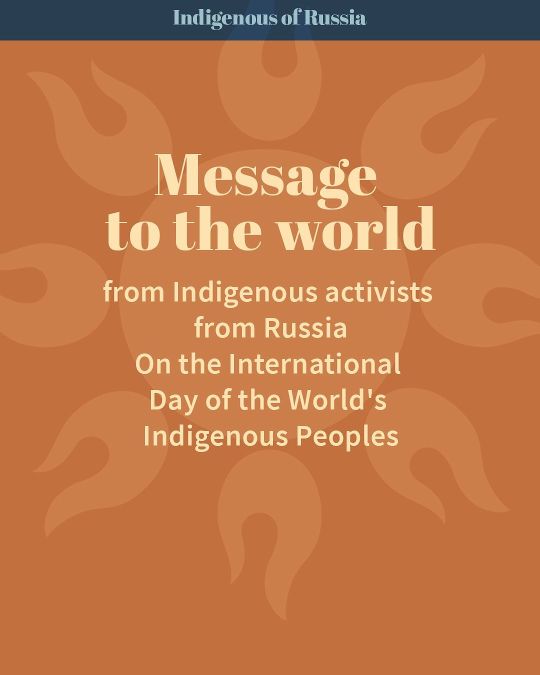
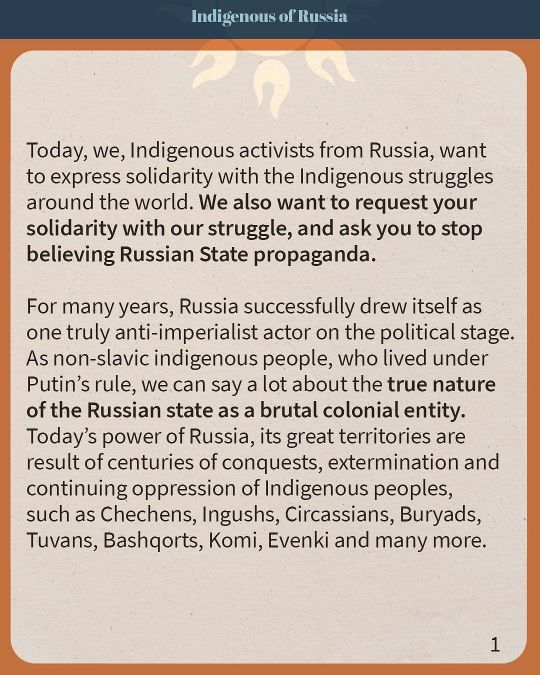

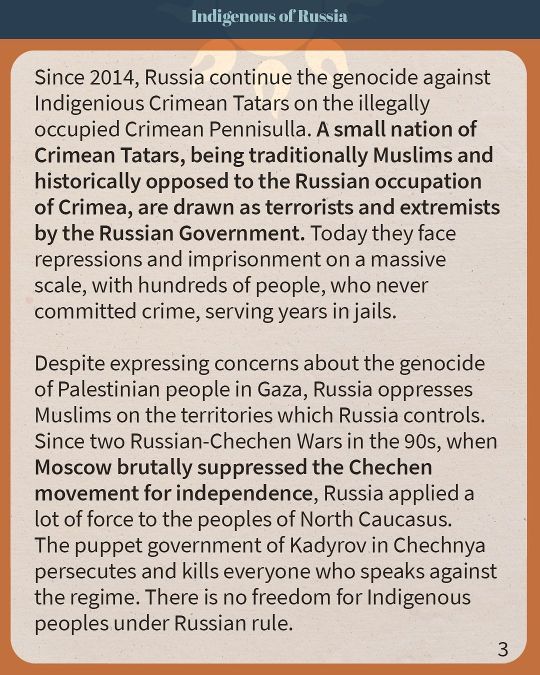
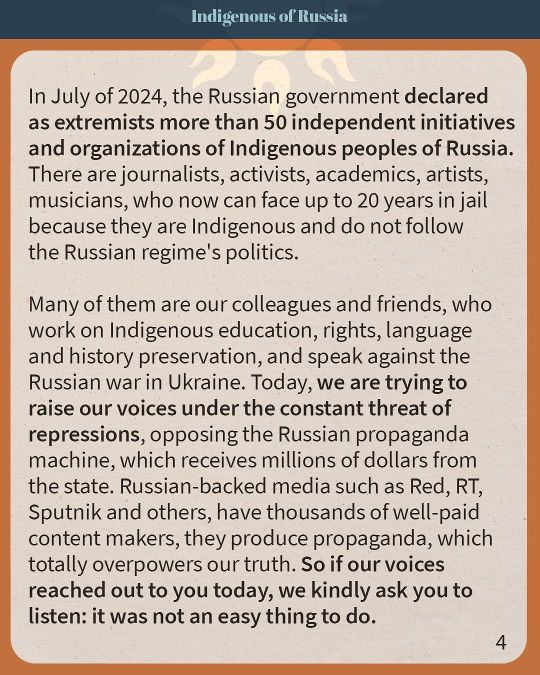
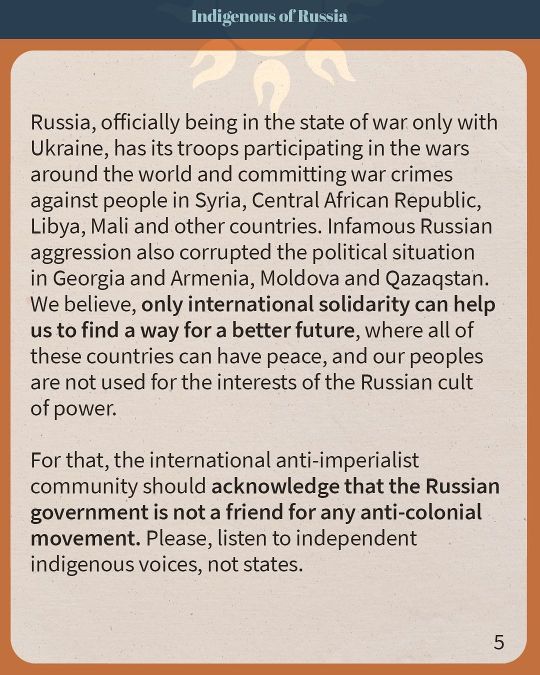
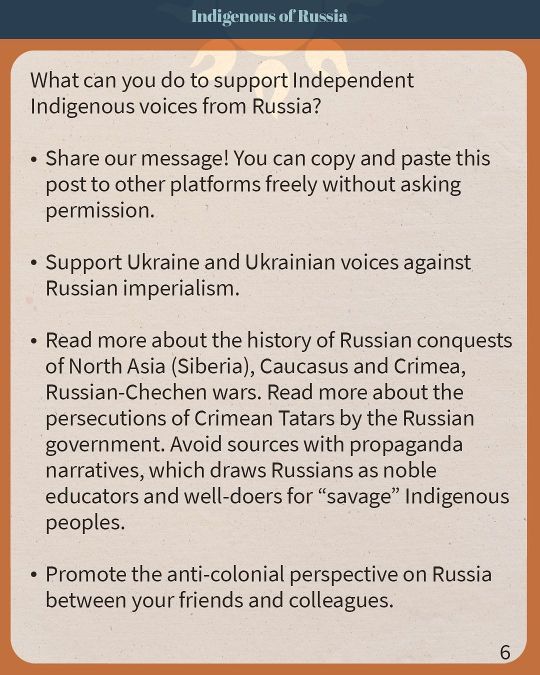
#indigenous#culture#important#indigenous russia#indigenous russian#fypシ#fypage#russia#colonization#landback#Land back#indigenous people#indigenous peoples#indigenous activism#native people#native rights#native#natives#fyppage#fypツ#fyp#tumblr fyp#native siberia#siberian indigenous#indigenous siberian#siberian#russian colonization#russian genocide#russian imperialism#russian
993 notes
·
View notes
Note
hey ! You seem to know a lot about siberia so i have a question. When the russians conquered siberia, how much of the indigenous population died, i've heard that actually because siberia is for a huge part non-settled the natives were just overflooded by the russians kind of like in canada but i was wondering if it was true.
Also the cossacks played a big role in the conquest of siberia but i've seen people saying they were russian cossack which i find weird because i was always told cossacks were ukrainians and those who speak russian are just russified due to imperial russia policy. So i wanted to hear your thought because you look like to know about it
I hope it didn't sounded weird or arrogant btw ^^'.
Hey, thank you for this ask.
The Russian conquest of Siberia was a process that happened over several centuries, and it did have significant implications for the indigenous populations of the region. Historical accounts on the casualties can vary though, due to limited records at the time
When the Russians began their expansion into Siberia in the late 16th century, they encountered a diverse range of indigenous peoples. The interactions between the Russians and the natives were often characterised by conflict, disease, and displacement, which of course, led to the decline of some indigenous communities.
We must remember though: The impact of Russian colonisation varied from region to region and depended on factors such as the local policies of Russian authorities, the resistance of the native peoples, and the availability of natural resources in the area.
However, it is widely acknowledged that the conquest resulted in significant demographic changes and hardships for many indigenous groups of Siberia.
Siberia was indeed sparsely populated in comparison to its vast size.
However it's an oversimplification to just say that the reason why Siberia was flooded by Russians was just because Siberian peoples were sparsely populated and "non settled".
Further I have an issue with projecting concepts such as settled or non settled onto indigenous groups. The terms "settled" and "non-settled" are often rooted in a Eurocentric colonial perspective, implying that European-style sedentary settlements are more advanced or superior to nomadic or semi-nomadic lifestyles, and during discussions about indigenous peoples, these concepts are weaponised against them to downplay or even justify their colonisation.
The Russian conquest of Siberia had devastating effects on the indigenous populations. The arrival of the Russians brought deadly diseases that led to a significant reduction in native numbers. There were conflicts and violence with indigenous groups, causing loss of life and displacement. Forced labour and exploitation also took a toll, disrupting traditional ways of life, and many indigenous communities were displaced from their ancestral lands, leading to cultural disruption and challenges.
Regarding the comparison to Canada's history with its indigenous populations, there are some similarities in terms of the impacts of colonialism, disease, and displacement. Both regions experienced significant changes to the indigenous populations due to the arrival of European settlers and the expansion of colonial powers. So yes, it's similar, but not in the way that you said it was (both groups indigenous peoples being "non settled" so that's why they were flooded/successfully colonised).
Regarding the role of the Cossacks in the conquest of Siberia, you are correct that they played a crucial part. However it was primarily Russian Cossacks as opposed to Ukrainian Cossacks.
In the context of Siberian conquest, the Russian Cossacks were an instrumental force in expanding the Russian presence eastward.
On the origins of the Cossacks in case some people are confused: The Cossacks emerged as a social and military phenomenon in the 15th and 16th centuries, primarily in the frontier regions of the Polish-Lithuanian Commonwealth, the Grand Duchy of Moscow, and the Crimean Khanate.
Originally, the term "Cossack" (from the Turkic word "qazak") referred to individuals living on the borderlands, often engaged in various military and raiding activities. Over time, Cossack communities formed and theh developed their own structures and traditions. They were known for their horsemanship and guerrilla warfare tactics, which made them valuable assets for the expanding Russian state.
Cossacks were largely autonomous and governed themselves through a form of self-rule known as the "Cossack Host".
As the Russian Empire expanded into Siberia, the Russian Cossacks became instrumental in the conquest of the vast region. They were well-suited for long-distance travel and warfare in the challenging Siberian environment. The Russian Cossack expeditions into Siberia involved trade, hunting, and conflict with local indigenous peoples.
I need to make clear here that Cossacks were/are not a homogenous group. They came from various ethnic backgrounds, including Ukrainians, Russians, Belarusians, and others. While Ukrainian Cossacks were prevalent in the areas of modern-day Ukraine and Southern Russia, Russian Cossacks were more common in the areas closer to the core Russian territories.
I'm also sorry if it seems like I'm teaching you to suck eggs here but I just want to make this clear:
There is a historical distinction between Russian and Ukrainian Cossacks, but it's important to understand that both groups shared similar origins and cultural ties.
As previously mentioned, Cossacks were originally formed in the borderlands of the Polish-Lithuanian Commonwealth and the Grand Duchy of Moscow (early Russia). Over time, they developed different branches: the Ukrainian Cossacks and the Russian Cossacks being two of them.
The Ukrainian Cossacks were primarily based in the territories of modern-day Ukraine and Southern Russia. They played a significant role in defending the Ukrainian territories from various threats, including raids from the Crimean Tatars and the Ottoman Empire. The Ukrainian Cossacks established semi-autonomous communities with their own elected leaders called Hetmans. One of the most famous Ukrainian Cossack groups was the Zaporozhian Cossacks, who were based in the Zaporizhzhia region along the Dnieper River.
The Russian Cossacks, on the other hand, were based closer to the core Russian territories, particularly in the regions of the Don and the Volga rivers. They were instrumental in expanding Russian influence and control over the vast frontier areas, including Siberia. The Russian Cossacks were organised into various hosts (military units) and were involved in both military campaigns and other activities such as exploration, trade, and agriculture.
While Ukrainian and Russian Cossacks had regional differences and distinct traditions, they shared common cultural and historical roots as East Slavic-speaking people.
Note: terms "Ukrainian" and "Russian" Cossacks don't solely refer to the ethnic background of the individuals but rather to the geographical areas where their respective Cossack communities were predominantly located
As the Russian Cossacks ventured deeper into Siberia, they encountered diverse indigenous populations. Yes; the Russian Cossacks played a crucial role in expanding Russian influence and control over Siberia.
The Ukrainian Cossacks on the other hand, had very little involvement in the expansion into Siberia. The majority of their activities were focused on defending the territories of present-day Ukraine and Southern Russia.
So, yes. Russian conquest of Siberia did have a devastating impact on the indigenous populations. It was also primarily Russian cossacks who were involved in the expansion into Siberia, not Ukrainian Cossacks.
However, I do need to touch upon this. Throughout their history, Cossacks have also faced oppression and challenges under the Russian state. They experienced forced labour and serfdom in the 18th and 19th centuries, losing their traditional freedoms. Russian policies of Russification aimed to assimilate them into Russian culture. Cossack rebellions, like the Pugachev Rebellion, were brutally suppressed. The Russian government also disrupted their communities through demographic changes and curbed their autonomy over time.
So. In summary:
We can't put a number on exactly how many of the indigenous population died due to limited records.
It is an oversimplification to say that the "non-settled" nature of the indigenous peoples is the reason why Siberia became flooded by Russians
The Russian conquest of Siberia was devastating on the indigenous populations.
Projecting European colonialist concepts such as "settled" and "non settled" onto indigenous groups ignores their unique ways of life and implies that a European "settled" lifestyle is superior to the indigenous "non settled" lifestyle and is often used to downplay or even justify their colonisation.
There is a difference between Russian and Ukrainian Cossacks, Russian Cossacks were the ones who were primarily involved in the expansion of Siberia.
Cossack groups themselves have faced oppression under the Russian state.
I hope this was helpful.
#Russia#Ukraine#Cossacks#Cossack#Russian colonisation#Russian colonization#russian colonialism#Russian imperialism#Siberia#Colonization of Siberia#Russian Empire#Russian history#Ukrainian history#indigenous peoples#indigenous people of russia#Indigenous people of Siberia#Indigenous Siberians#Siberians#Native Siberians#Colonialism#Indigenous people#Cw long post#Long post
121 notes
·
View notes
Text
"We were taught that Russia's presence in Kazakhstan was a generous gift of civilization. We were taught that Russian language was our lifeline to modernity. We were taught that Kazakh language was archaic and unsuitable for science and technology." —Dr. Azamat Junisbai
Source: Matryoshka of Lies. Episode 1: Confusion
2 notes
·
View notes
Text
The reference about colonization of laika types can be found here:
Popov, Aleksander V. “Hunting Laika” [PDF, 1.91 MB]. Journal of the International Society for Preservation of Primitive Aboriginal Dogs 31 (2012): 29 – 37. Retrieved March 2, 2024. Archived from the original on March 18, 2015 via Wayback Machine. Would put the screenshots up in the reblog post, but there are too many quotes to draw from and they are from different stages of Russian history. But yes, Moscow was (and continues to be) extremely paternalistic towards Indigenous peoples.
A majority of “indigenous dog breeds” are colonized in some way. Options include:
Given an arbitrary kennel club standard based on a limited population owned by aristocratic white people.
Stolen with their history completed rewritten and mythologized.
Created by white kennel club people and falsely attributed an indigenous past through breed myth.
Have their populations no longer under control of the population that made them in the first place.
Has its actual name replaced with a slur
“Breed split” where the actually indigenous dogs still owned by indigenous people have to go through meticulous trial and breeding to be accepted by the kennel club.
All of the above and more!
#Indigenous dogs#hunting laikas#paternalism#Russian imperialism#Russian colonization#imperialism#colonialism#colonization#Soviet paternalism#Russian chauvinism
785 notes
·
View notes
Text
Ukraine is not the first country to face brutal and indiscriminate tactics of waging war against civilians. In October 1999, Russian missiles hit a maternity hospital in Grozny. At least 30 people died in the attack that day, including women and newborn babies, the AR agency reported. Grozny was razed to the ground, similar to Mariupol. Almost two decades later, in 2016, Russian airstrikes on Aleppo in Syria destroyed virtually all of the city’s hospitals and medical facilities. The killing of doctors was a deliberate strategy, because by killing one doctor, you kill a hundred other people,” notes Janine di Giovanni, executive director of The Reckoning Project, who worked as a reporter during Putin’s wars in Chechnya and Syria.
#ukraine#syria#chechnya#ichkeria#russia#imperialism#colonialism#genocide#russia is a terrorist state#russian culture#war crimes#russia must be stopped and made to relinquish all the lands their white asses colonised in the last centrury#because these are the lands they get resourced and manpower from to wage MORE colonization wars#in XXI century no less#barbarism#україна#укртумбочка#укртумба#укртамблер
167 notes
·
View notes
Text
"Don't escalate" - they said
Say that fucking Russians for who peace talks never work. Especially now, when aid to Ukraine keeps postponing.



Today, my hands are shaking and my heart hurts, even though it shouldn't. The fear of the number of human victims because of Russia is killing me.



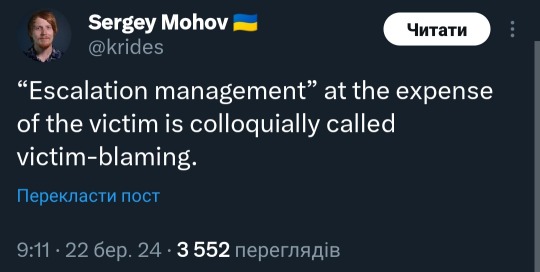
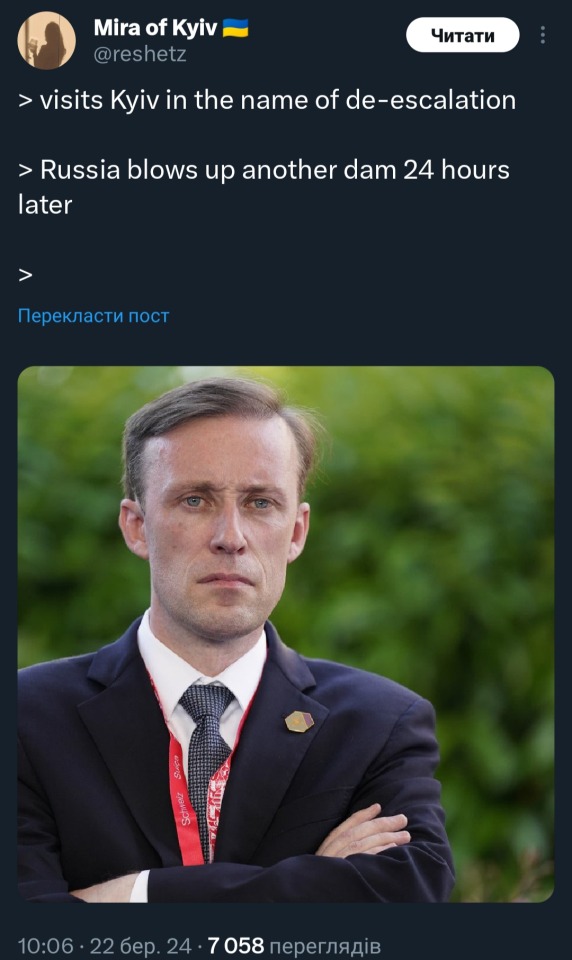
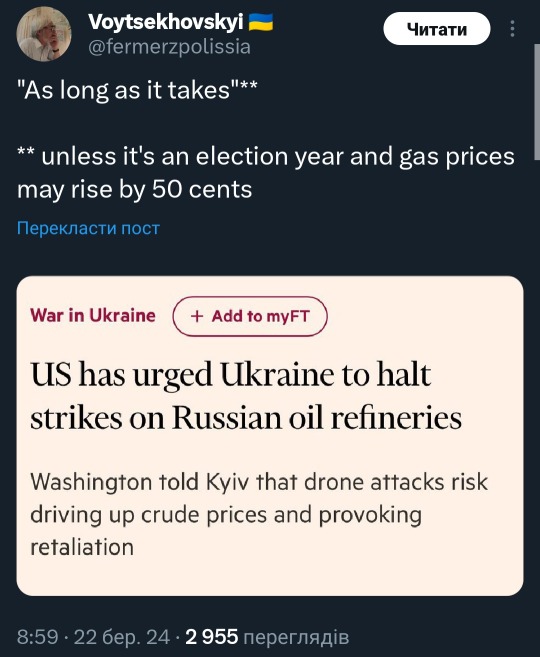
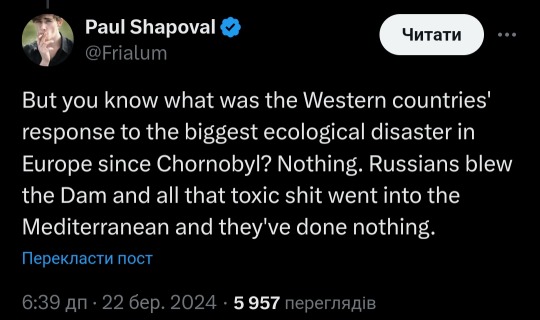
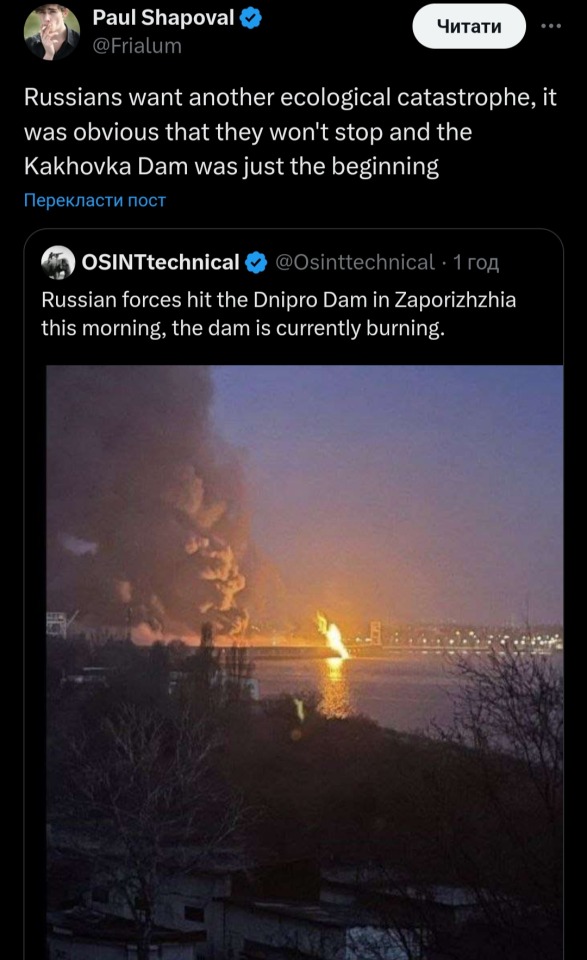
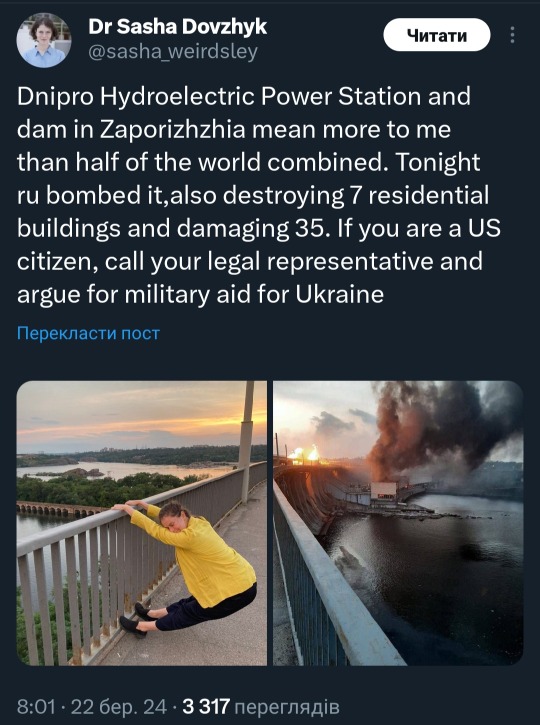
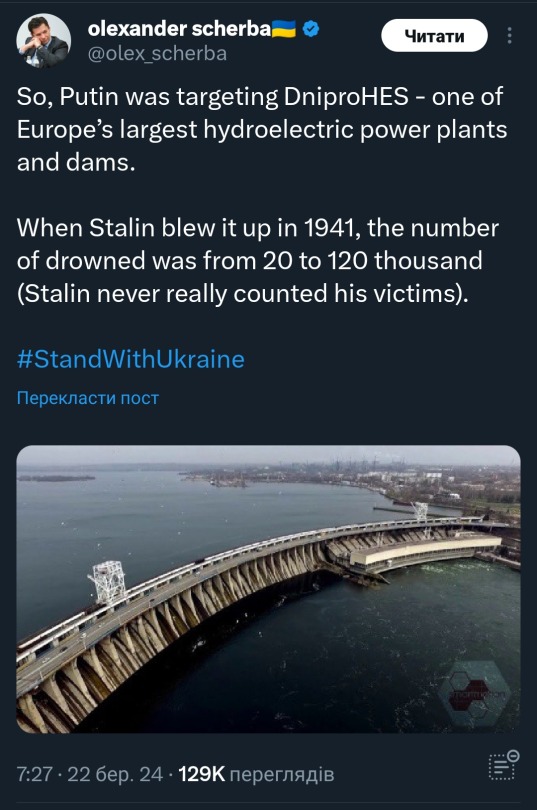
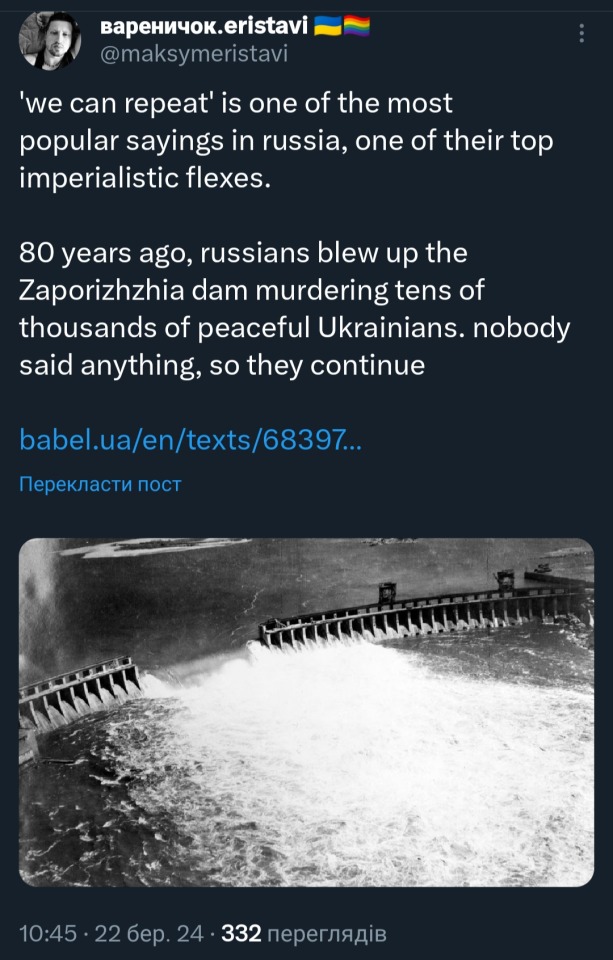
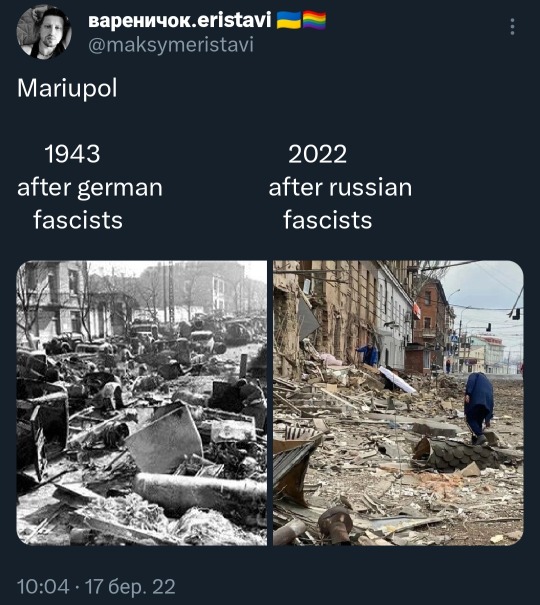
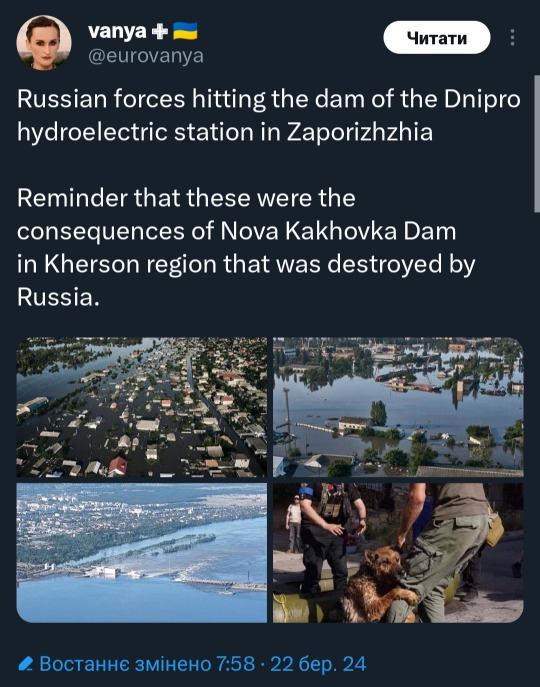
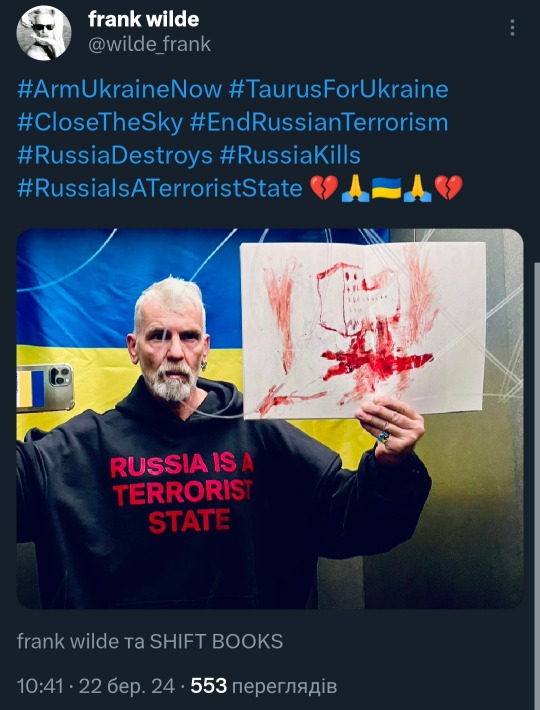

Please keep spreading our voices and donate to our army and combat medics (savelife.in.ua, prytulafoundation.org, Serhii Sternenko, hospitallers.life, ptahy.vidchui.org and u24.gov.ua).
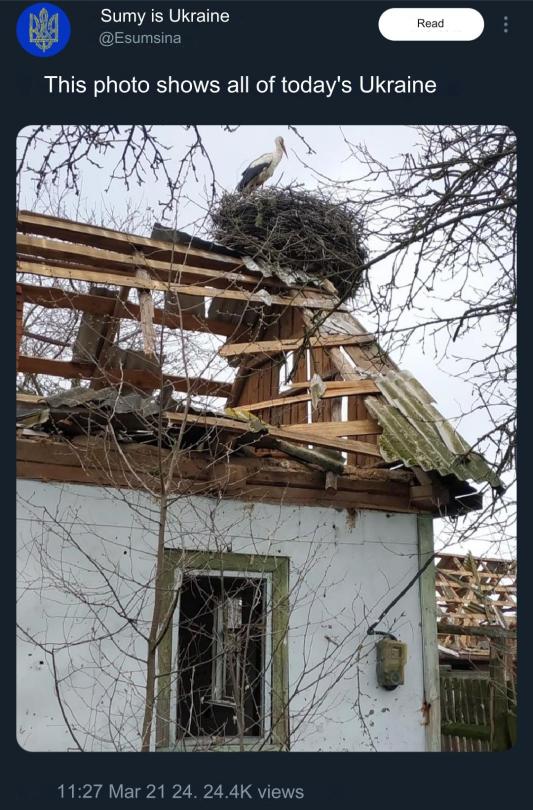
The Ukrainian mental health is held on this every day.
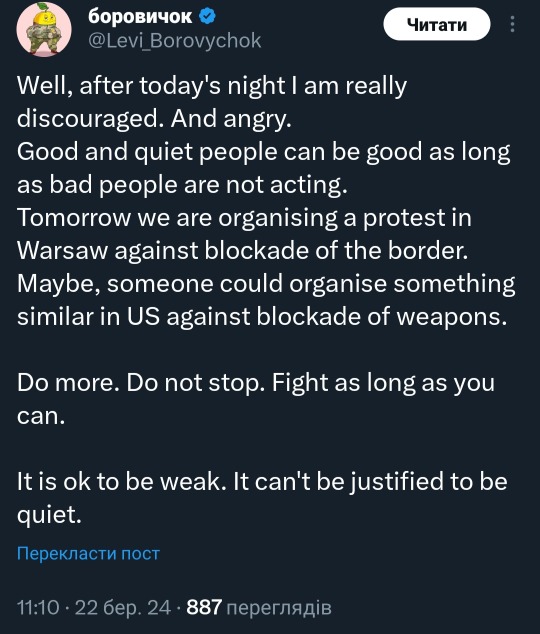
Yes, please don't be ignorant. Ukrainians need that energy and hope boost to hold on now.
#ukraine#russia#arm ukraine#stand with ukraine#український tumblr#genocide#stop the genocide#russia is a terrorist state#russo ukrainian war#russian invasion of ukraine#dnipro#zaporizhzhia#Khmelnitsky#russia invades ukraine#russian terrorism#stop russia#russian imperialism#russians#russian colonialism#colonial violence#colonialism#colonization#stop terrorism#armukraineasap#standwithukraine#video post#video#text post#text#life stuff
444 notes
·
View notes
Text

vainakh tower architecture is a historic style of architecture characteristic to chechnya and ingushetia. they've been noted as far back as the 1st century, but most we see today were built between the 15th-17th. the towers are built with stone blocks, range from 10-25 meters high, and feature walls which taper the higher the tower reaches. they were multi-purpose, used as silos, residence, and fortresses. wealthier families usually had at least one built for their community.
these towers, located in niy, ingushetia, are clustered together because they were built for defensive purposes. the "pyramid roofs" are unique to ingushetia, but similar roofs can be seen in other types of caucasian architecture, such as in nearby ossetia.
279 notes
·
View notes
Text
being an east european disco elysium fan gives you a bit of a complex in a good way until you replay the game and realize you lowkey sound like the mega rich light bending guy
7 notes
·
View notes
Text

The desire of the missionaries was that the Africans abandon their religion and culture and adopt western religion and culture, which they hoped would facilitate the extension of colonialism.

The motive was, therefore, to prepare the Africans mentally for the takeover by colonizers

#african#afrakan#kemetic dreams#africans#brownskin#brown skin#afrakans#afrakan spirituality#african culture#colonizers#fuck colonizers#british#britishfashion.#british royal family#british royalty#britisharmy#american#london#great britain#famous people#russian#british columbia#christianity#theology#jesus#bible#jesus christ#christian#religion#religions
11 notes
·
View notes
Text









#indigenous#culture#important#fypシ#indigenous russia#indigenous russian#fypage#colonization#russia#landback#siberian indigenous#native siberian#indigenous siberian#siberian#buryatia#Buryat#indigenous rights#indigenous people#native people#native rights#native#Natives#Scientist#science#Facts#mobilization#russian genocide#russian colonization#russian imperialism#genocide
148 notes
·
View notes
Text
Ghost is the type of mfer to sleep in such a wide array of things every night. Sometimes just boxers. Sometimes a pair of sweats. Sometimes just a shirt. Sometimes Toast’s shirt. Sometimes matching pajama set. Sometimes mix n matched pajama sets. Sometimes onesies. Sometimes a robe. Sometimes entirely nude. Sometimes the entire outfit he wore that day (shoes probably included too cuz he is a bastard). When Toast opens his door in the morning it’s a slot machine of What Will It Be This Time.
AND WHILE IM ON THE SUBJECT—
You know this meme?

Toast is the left and Ghost is the right. No I do not take criticism.
Listen. I would say they’re interchangeable. BUT. Toast is SUCH a honkshoomimimi mfer. Literally the most honkshoomimimi ever to exist. Laying in bed on his back, snoring and blowing the ball on his hat up and then it floats down to almost touch his face and he snores it back up again, feet sticking out of the end of the blanket. Honkshoomimimi.
AND ANOTHER THING—
I feel like Ghost has two (2) ways he sleeps every night and, again, Toast never knows which he’ll walk in on in the morning. One is the inconceivable “that can’t possibly be comfortable” position probably featuring drooling and snoring. The other is the damsel in distress dainty pretty princess sleeping beauty position. There is no in between.
#Ghost’s sleeping life is Russian roulette for Toast#when Colon and Spooker learn about this they make bets about it with each other#headcanon#not a fic#taleblr#venturiantale#vt johnny ghost#johnny ghost#johnny toast#venturiantale pie#p.i.e#p.i.e.#paranormal investigators extraordinaire#toastedghost#johnnyshipping
40 notes
·
View notes
Text
youtube
Honestly, this is such a great video about russian culture and how it is weaponized, how it corrupts. How russian imperialism uses culture, especially literature, to expand their empire. Even fucking Voltaire... Even him.
Please watch this, especially if you are NOT Ukrainian! Especially if you're Polish. The video has English subtitles!
#russian propaganda#russian culture#russian imperialism#russia is a terrorist state#imperialism#colonialism#anti colonialism#anti colonization#anti imperialism#Youtube
34 notes
·
View notes
Text

Hear me out, what if period drama but make it Kalmyk?
#art#oirat#kalmyk#indigenous#russian empire#illustration#steppes#decolonisation#russian colonialism#colonization#our world#my art#ger#yurt#nomad#central asia
8 notes
·
View notes
Text
'the reason why i say nobody should interact with anything israeli ever but don't have that same rigor for russia is because russia is a country with a long history that israel doesn't so there' okay and do you think that long history was also sunshine and rainbows? do you think russia got to the size that it did with the power of friendship? do you think russian history only started in february of 2022? are you stupid?
#personal#that's my semi controversial post of the day#(also not to mention that half the stuff people find so great about russia are ukrainian things that russia stole through colonization)#(and if not ukrainian than from some other either ethnic minority in russia or former soviet state)#like i don't feel i have a leg to stand on when it comes to 'should you ever engage with anything from This Bad Nationality' takes#because i'm not part of any of the affected parties beyond being a person who can read words#but if you're gonna do it about ONE group at least be consistent and do it about all groups#it's like that bit where daniel penny and luigi mangione were happening in the same week#and people were giving completely opposite takes depending on who they supported#despite fundamentally the same thing happening in both cases#once again the defining characteristic of gen z takes on current events is astounding hypocrisy#and an inability to hold consistent views even if it means smth you support is affected#(because let's be honest the reason why the children don't hold what russia is doing in ukraine)#(to the same standards as what israel is doing to palestine)#(is because they think communism and the soviet union are Super Mega Based and thus don't want to criticize it)#aka hypocrisy#(also one of the posts i saw with this take mentioned that things in russia they liked included ballet and esfrgthsgafr)#(ballet is not exclusively a russian thing you can enjoy ballets from other countries i promise)#(there are other ballet composers other than tchaikovsky if you don't have an iq of 2 and i say this as someone)#(who loves tchaikovsky's music)
2 notes
·
View notes
Text
The Russians are bloody butchers - now this will finally see the light of day
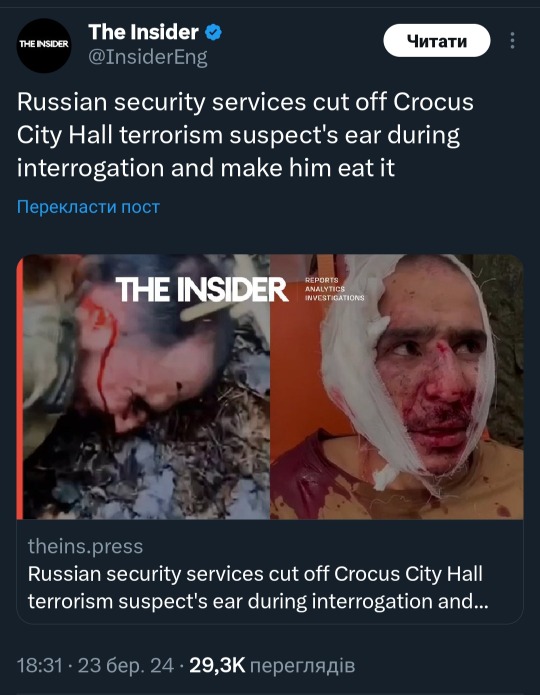

We know that it is not difficult for Russians to cut off an ear or something else, especially with our soldiers and patriots under occupation. Or just because we are Ukrainians.
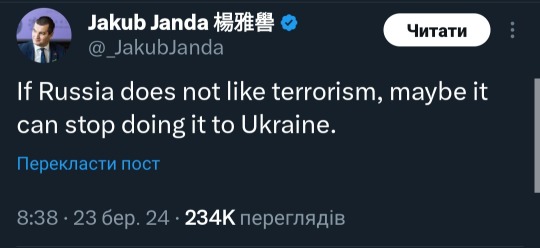


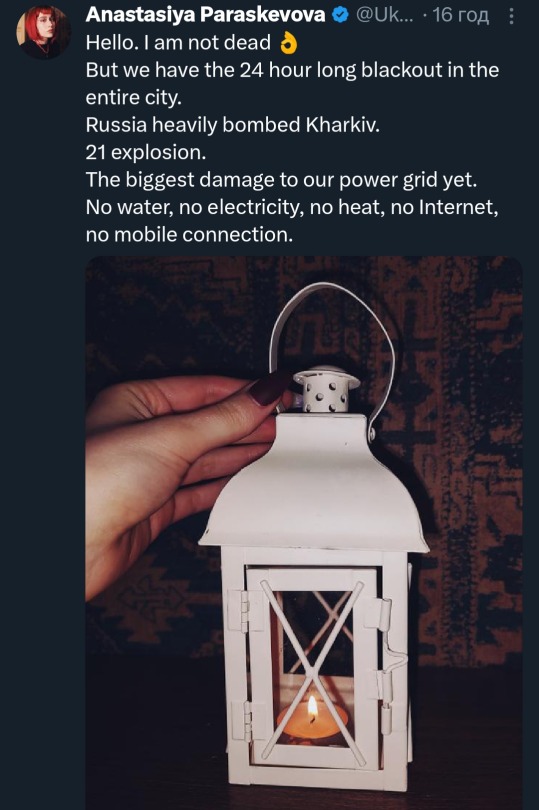
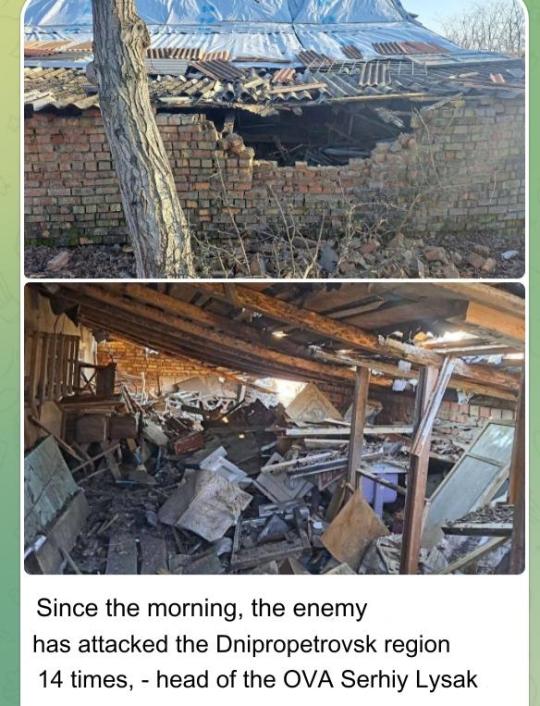

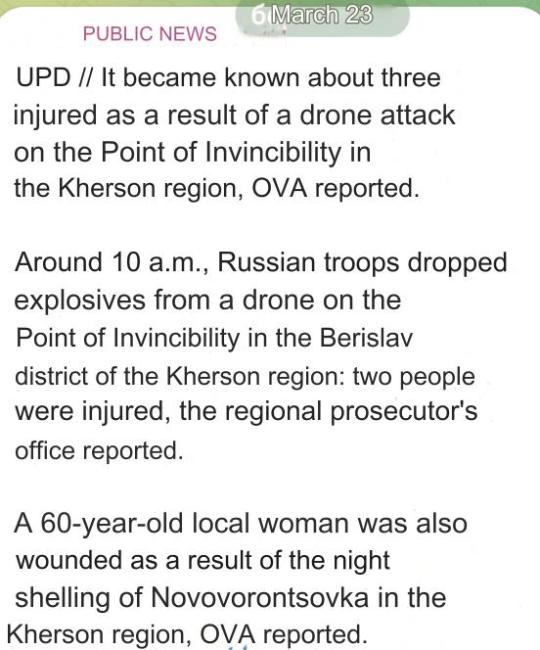
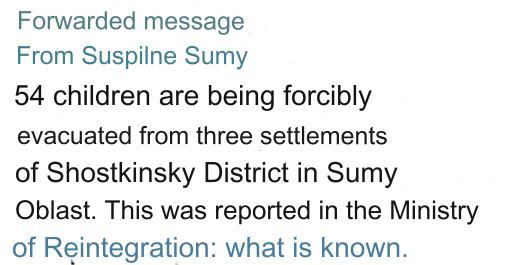


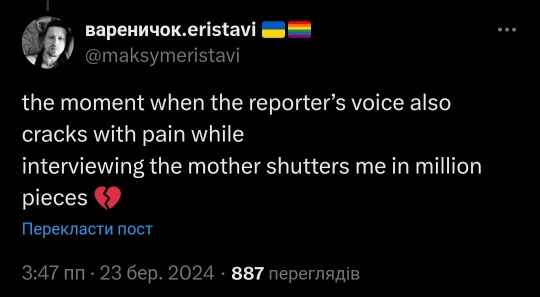




Please keep spreading our voices and donate to our army and combat medics (savelife.in.ua, prytulafoundation.org, Serhii Sternenko, hospitallers.life, ptahy.vidchui.org, and u24.gov.ua).
Ukrainians, please take care of yourselves, and react to the air alarm. I wish everyone sweet dreams, except Russians and their supporters.
#ukraine#russia#russian terrorism#stop russia#arm ukraine#stand with ukraine#український tumblr#genocide#stop the genocide#russia is a terrorist state#russo ukrainian war#russian invasion of ukraine#colonial violence#russian colonialism#colonialism#colonization#russia invades ukraine#russian imperialism#russians#war in ukraine#support ukraine#support#war is real#russian war crimes#war crimes#war#important#text#tw torture#tw blood
279 notes
·
View notes
Text



an approximate map of pre-european contact (though the last one seems to be post-contact) language families in continental north america, showing the spread and migration of different groups throughout the continent. some notes:
these maps include 42 independent language families, 37 isolates, and over 20 linguistic areas altogether.
the oto-manguean (180), uto-aztecan (69), algic (46), and na-dené (45) families have the most languages within them.
the north american family with the most widely-spoken languages is the uto-aztecan family. the most widely-spoken indigenous language in north america today is nahuatl, an uto-aztecan language which is spoken in central mexico and diaspora in the united states by over 1.7 million people.
other widely-spoken indigenous languages in north america today are the various mayan languages spoken throughout guatemala, belize, and mexico such as q'echi', k'iche', mam, tzeltal, and tzotzil.
in general, mexico, guatemala, and belize are home to most of the most commonly spoken indigenous north american languages. other large north american countries such as the united states and canada house comparatively few speakers. (the most common in the former is navajo (na-dené, 170,000), and in the latter, cree (algic, 96,000).) differences in colonization methods and population density/climate/environment before the fact account for the lower numbers.
the linguistic diversity/number of language families in a given area is mostly due to climate and environment. drier and flatter regions are lower in linguistic diversity as the space facilitates the movement of the population within them. (the same thing happened with the turkic and uralic families.) more mountainous and lush environments discourage this. (this happened in what's today papua new guinea.)
the relation between north american and siberian indigenous languages has been hypothesized, but no definite conclusion has been accepted. the most famous theoretical grouping is the hypothetical dené–yeniseian family, which links the na-dené family with the yeniseian languages of central siberia. a family which definitely stretches out to siberia is the inuit–yupik–unangan family (referred to here a eskimo-aleut).
due to colonization, including forced displacement and assimilation, there are many native languages which are either unattested to or were wiped out altogether. these maps only consist of what we know about.
#turtle island#languageposting#my posts#couldn't find a great map of central american languages#or of the carribean islands. sorry about that#also please don't take ''colonization differences'' as the british somehow being worse or the spanish being kinder#the spanish british french dutch portugese and russians all had the same goal they just had different ways to achieve it#(yes russians were there too they were just on the other side of the continent & not as successful)
42 notes
·
View notes